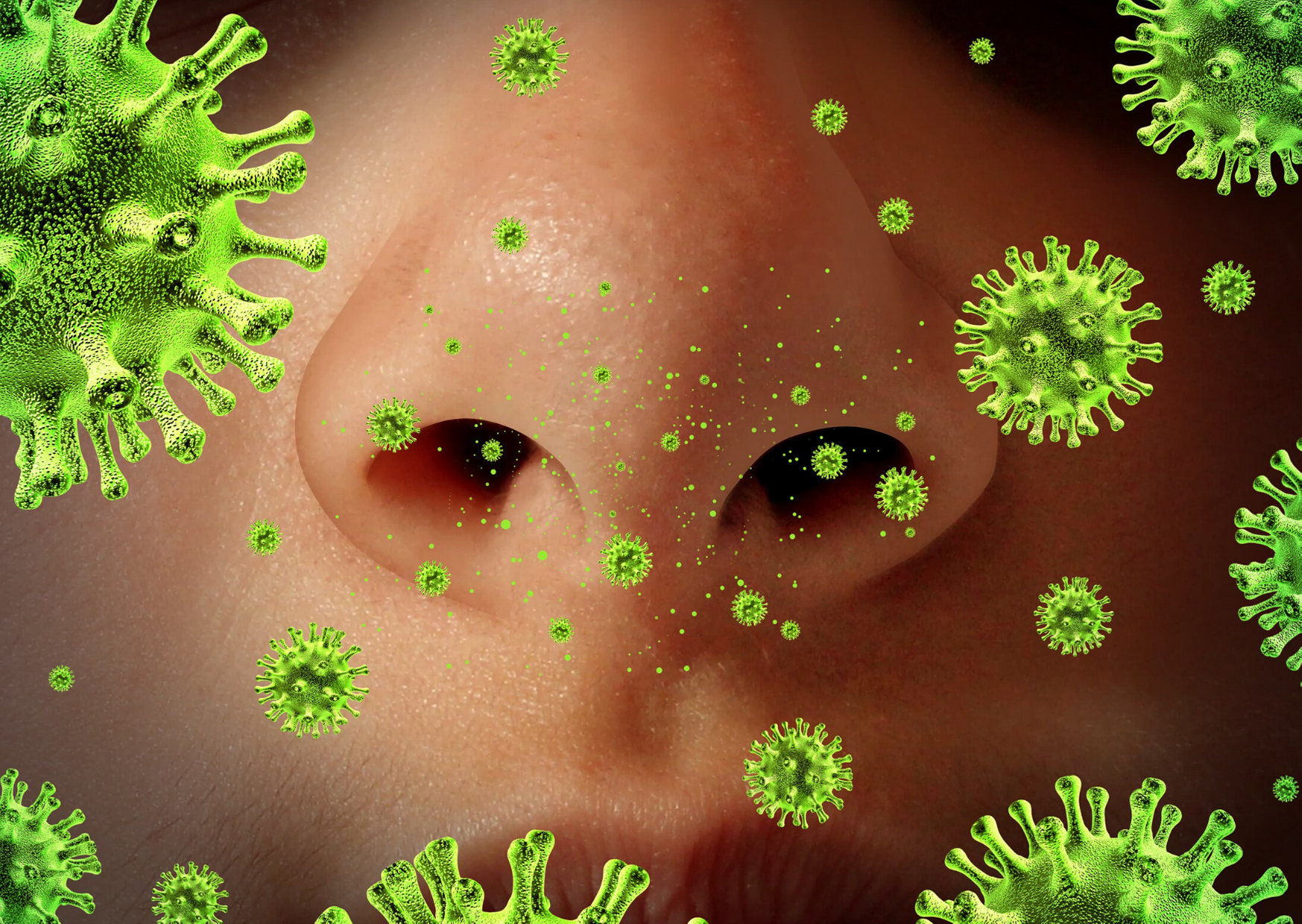Flu
Flu, or influenza, is a respiratory illness caused by a viral infection. It is highly contagious and is transmitted through droplets released when an infected person coughs, sneezes, or speaks.
What are the symptoms of flu?
Flu is characterized by a sudden fever, a cough (generally dry), aching muscles and joints, headache, sore throat, general unwell feeling, nasal congestion, and runny nose.
The cough may be severe and may last for up to two weeks or more. In most cases, the fever and other symptoms clear up within a week. Some people may experience vomiting and diarrhea, although this is more common in children than in adults.
Most people who get the flu will experience a mild illness and will recover in less than two weeks. However, some people are more likely to develop complications from influenza that could result in hospitalization and, sometimes, death.
Pneumonia, bronchitis, sinus infections, and ear infections are examples of flu-related complications.
Flu may also exacerbate chronic health problems. For example, people with asthma may get asthma attacks during a bout of flu, and people with chronic congestive heart failure may find that their symptoms worsen due to having influenza.
Those at highest risk of complications of serious illness are pregnant women, children under 59 months, elderly people, and patients with chronic illnesses (heart, lung, kidney, metabolic, neurological development, liver, or hematological diseases) or a compromised immune system (due to HIV/AIDS, cancer, chemotherapy, or corticosteroid therapy).
Types of flu virus
There are four types of seasonal flu viruses: A, B, C, and D.
There are four types of seasonal flu virus: A, B, C, and D, with various subtypes, or strains. The types that cause seasonal epidemics are type A and B flu viruses, while the type D virus mainly affects livestock and does not seem to infect or cause illness in humans.
Some strains of the type A flu virus, like the H5N1 strain, also known as “bird flu“, occasionally cross over into humans and cause serious illnesses. Experts trace these strains carefully and try to predict how they might mutate and affect people.

What is the treatment for the flu?
Flu can be treated with antiviral drugs.
Experts recommend rapid treatment for patients who have or are suspected of having flu and have a high risk of serious complications, such as people with asthma, diabetes (including gestational diabetes), or heart failure.
It is important to remember that the flu is a viral infection and therefore cannot be treated with antibiotics.
People who are not at risk or complications should receive symptomatic treatment, i.e. treatment to relieve symptoms such as fever. If their symptoms get worse, they should seek medical advice.

How can fever be prevented?
The most effective way to prevent this illness is through vaccination. It is a good idea to get an annual flu vaccination. The most widely used types of vaccines worldwide are injectable inactivated vaccines.
The WHO recommends annual flu vaccination for:
- Pregnant women at any stage of pregnancy.
- Children aged 6 months to 5 years.
- People aged 65 or over.
- People will chronic illnesses.
- Health care workers.
As well as vaccination, there are things you can do to help prevent catching the flu:
Washing your hands frequently and drying them properly.
Covering your mouth and nose with a tissue when you cough or sneeze, then throwing the tissue in the bin.
Staying at home as soon as you notice a fever or other flu symptoms.
Avoiding contact with sick people.
Trying not to touch your eyes, nose, or mouth.
FAQs about flu
How can you distinguish between flu and cold?
The flu and the common cold are respiratory illnesses caused by different viruses. Because these two types of diseases have similar symptoms, it can be difficult to distinguish between them based on symptoms alone. In general, the flu is worse than the common cold and symptoms are more intense.
People with colds are more likely to have a runny or stuffy nose. Also, colds generally do not cause serious health problems, such as pneumonia, bacterial infections, or hospitalizations. The flu, however, can lead to serious complications.
| SYMPTOM | COLD | FLU |
|---|---|---|
| Runny nose | Yes | Sometimes |
| Sneezing | Yes | Sometimes |
| Cough | Yes, with mucus | Dry cough |
| Sore throat | Yes | Sometimes |
| Physical pain | Slight, headache | Muscular pain and headache |
| Fever | Rare in adults. | Yes |
| Shivering and sweating | No | Yes |
| Nausea | No | Sometimes |
| Onset of symptoms | Slow, in days | Fast, in hours |
How many people get the flu each year?
Epidemiological studies estimate about 3% during the contagious stage.
You can spread the flu to other people both before symptoms appear and after you start feeling ill.
Is the flu exclusively a winter virus?
Flu season generally lasts from November to March, although you can catch it as early as October and as late as May.
When is it contagious?
People with flu are at the greatest risk of spreading the illness during the first 3-4 days after the onset of symptoms.
Some healthy adults may infect others from 1 day before symptoms appear and up to 5-7 days after becoming ill.
How effective is the flu vaccine?
Studies are carried out every year to establish how much protection the flu vaccine gives people. Although its level of effectiveness can vary, recent studies show that the flu vaccine reduces the risk of catching the flu by between 40% and 60% among the general population during the periods in which most of the circulating flu viruses coincide with the vaccine strains.
In general, current flu vaccines tend to work better against influenza B and influenza A (H1N1), while offering less protection against influenza A (H3N2).
What factors affect the effectiveness of the vaccine?
At least two factors play an important role in determining how effective the vaccine is likely to be in providing protection against the virus:
- The characteristics of the person receiving the vaccine (such as their age and general state of health).
- The similarity between the viruses in the vaccine and the viruses that are causing the epidemic.
The flu virus has the highest mutation rates, and this decreases the effectiveness of the vaccine. It also means that if you have already caught the flu, you can catch it again in the future, because the virus is constantly changing.
What are the side effects of the flu vaccine?
Mild side effects of the flu vaccine include pain, redness, or swelling at the injection site, and low fever and aches. Only between 1 and 2% of people who receive the vaccine will experience fever as a side effect.
Rare but serious side effects may occur such as allergic reactions. The symptoms of serious side effects include difficultly breathing, swelling of the eyes or lips, hives, increased heart rate, dizziness, and high fever.
Can I develop the flu from having the vaccine?
It’s a myth that you can get the flu from having the influenza vaccine.
The viruses in the flu vaccine are either eliminated or inactivated, meaning you can’t get the virus from having a flu shot.
However, as immunity (protection from the virus) takes around two weeks to build up after being vaccinated, some people may catch the flu shortly after having their jab, if they are exposed to the virus during this period.
Cold symptoms are sometimes mistaken for a reaction to the vaccine.
Who should not receive a flu vaccination?
Babies under 6 months cannot be vaccinated against the flu. In general, people who have had a severe allergic reaction to a flu vaccine in the past should not be vaccinated again.
People with a high fever should not receive the vaccine (they should wait until the fever has subsided).
Can I get the flu through exposure to the cold?
No. Flu season generally coincides with the winter months, which is why a lot of people associate it with cold weather, but the only way to catch the flu is through exposure to the virus that causes it.
Can antibiotics be used to treat the most serious cases of flu?
Definitely not: antibiotics fight against bacteria, but not viral infections such as flu. Treatments for influenza generally focus on alleviating the symptoms.
The best ways to alleviate the symptoms are: to rest, drink a lot of liquids, and avoid drinking alcohol or smoking. If necessary, you can take some specific medication to alleviate the symptoms (such as antipyretics to bring down the fever, etc.).


